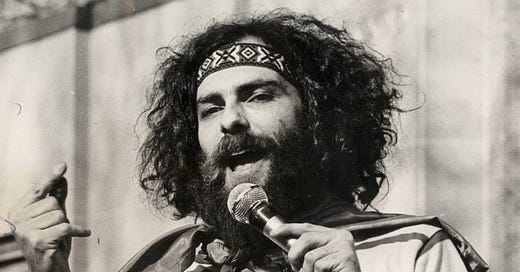Jerry Rubin
Jerry Rubin (1938–1994) was an iconic figure in the American counterculture and anti-war movement of the 1960s and 1970s.
His journey from radical activism to a later career in business is a fascinating reflection of the changing times he lived through.
Early Life and Education
Jerry Rubin was born in Cincinnati, Ohio, in 1938. He attended the University of Cincinnati, where he began his foray into activism by organizing protests against local establishments that practiced racial segregation. Rubin's early activism was also shaped by his involvement in the civil rights movement, including a brief stint working with the Student Nonviolent Coordinating Committee (SNCC) in the South.
Rise as a Counterculture Leader
In the mid-1960s, Rubin's focus shifted towards the anti-Vietnam War movement, marking the beginning of his rise as a national figure in radical activism. He gained national attention in 1967 when he organized a march on the Pentagon to protest the Vietnam War, which became one of the most significant anti-war demonstrations of the era.
Co-founding the Yippies
Rubin's activism took on a more theatrical and provocative turn with the founding of the Youth International Party (Yippies) in 1967, alongside Abbie Hoffman and others. The Yippies were known for their colorful, often anarchic protests against mainstream society and politics, blending radical activism with performance art. One of their most famous stunts was the attempt to levitate the Pentagon during an anti-war protest.
The Chicago Seven Trial
Rubin's activism led to legal trouble, most notably his arrest and trial as part of the Chicago Seven (originally the Chicago Eight). The group was charged with conspiracy and inciting to riot due to their involvement in the protests outside the 1968 Democratic National Convention in Chicago. The trial became a media circus, with Rubin and his co-defendants using the courtroom as a platform for political theater. Rubin, along with four others, was initially convicted of crossing state lines to incite a riot, but the convictions were later overturned on appeal.
Transition to Business and Later Life
In the 1970s, Rubin's life took a surprising turn as he distanced himself from political activism and moved into the world of business. He became involved in network marketing and the health food industry, reflecting a broader shift in his focus from social revolution to personal transformation. Rubin's later years were marked by his embrace of capitalism, which he once vehemently opposed, and his involvement in self-help and personal growth movements.
Death and Legacy
Jerry Rubin's life came to a tragic end in 1994 when he was struck by a car in Los Angeles, leading to his death at the age of 56. His journey from a radical activist to a businessman captures the complex dynamics of the counterculture movement and its evolution over the decades. Rubin's legacy is a testament to a period of profound social and political upheaval, embodying the spirit of rebellion and the capacity for change.


